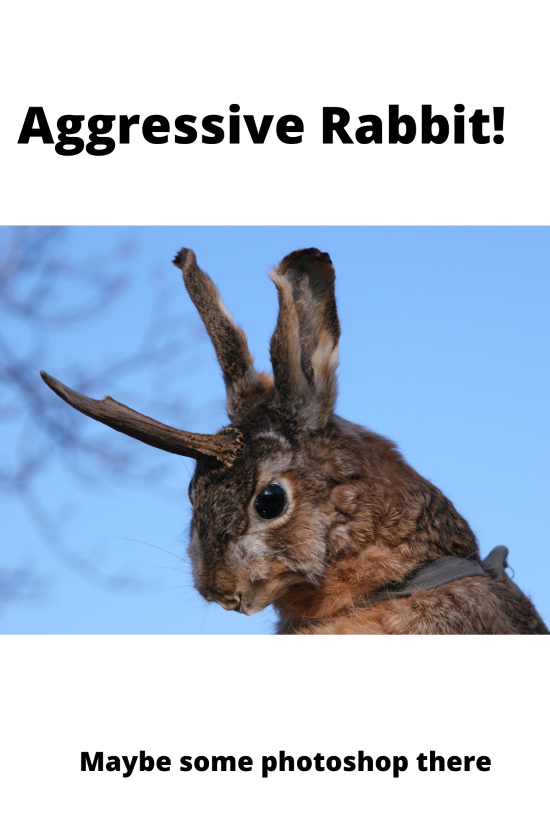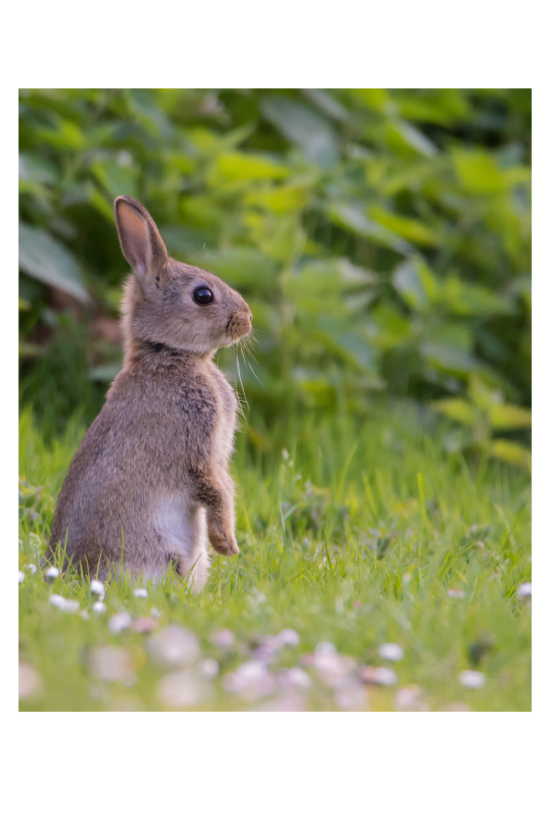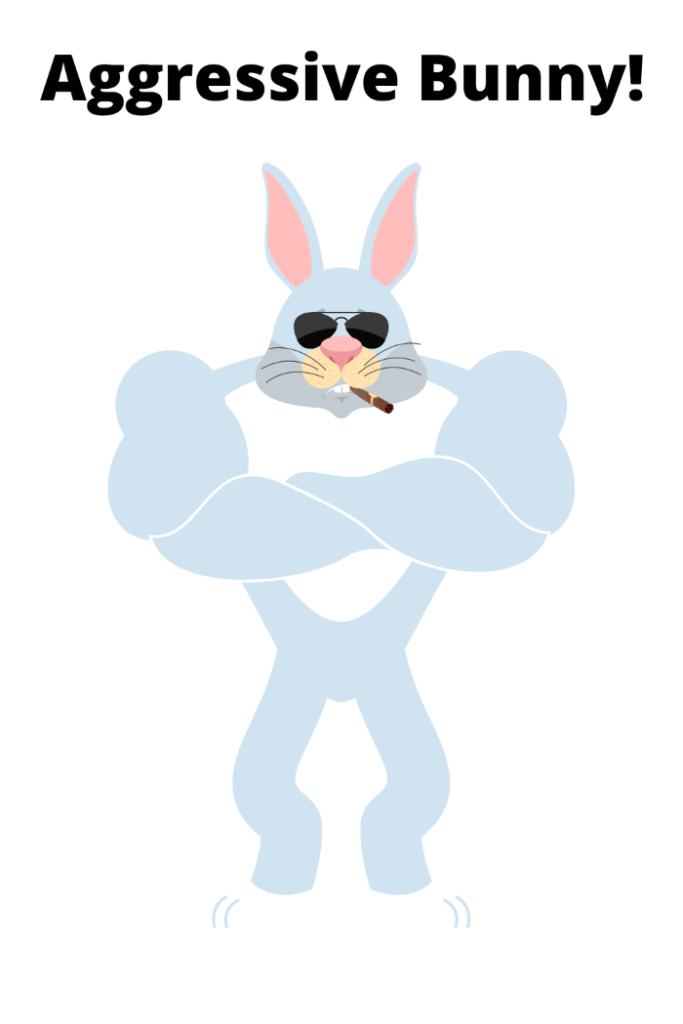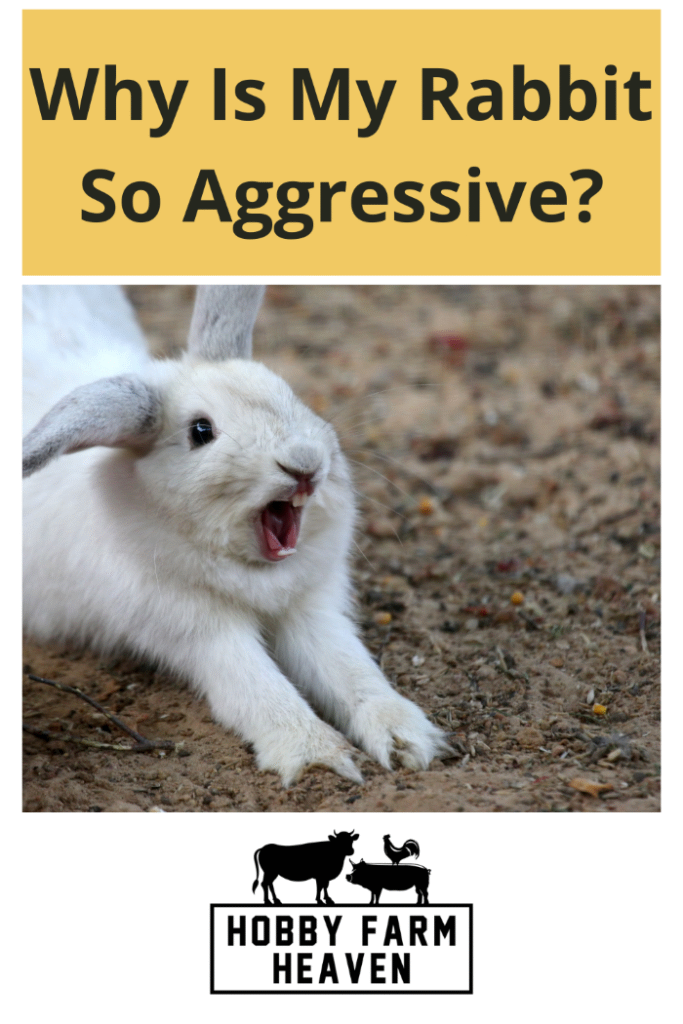Here at Hobby Farm Heaven we hear questions about aggressive rabbits all the time, such as:
“Why is my rabbit so aggressive?”
Generally, Rabbits are aggressive or become aggressive due to hormonal change as they mature, injury, sickness or failing health, bunny bullying, or emotional conditioning (as in they have been mistreated).
You can remedy any of these aggressive situations with deliberate actions, patience and care. In this article we discuss the most likely reasons and provide some workable solutions for you.
Read on to see how neutering an adult rabbit can
help curb aggressive behavior and prevent deadly disease!
Why Is My Rabbit So Aggressive
Set The Stage: Realize that if your rabbit is acting aggressively, then it may be caused by:
- Hormones,
- Injury,
- Bunny Bullying,
- An experience based emotional problem, or
- A combination of two or more of these factors.
Why Would A Rabbit Become Aggressive
We’ll elaborate on each of these a little before addressing strategies and tactics for dealing with the aggressive bunny.
Remember that Bunnies are prey animals and often react to perceived threats with the classic flight or fight response. If the bunny can not run away (flight), then it’s only option is to fight!
If your rabbit has been neutered for several months and is still acting aggressively, then it perceives a threat in its environment. We may not be aware of the threat that the rabbit perceives.
Try to put yourself in the rabbit’s shoes… er, I mean feet 🙂
Rabbit Hormones
As rabbits mature their hormones significantly change.
Often, these hormonal changes lead to sustained aggressive behavior.
Many experienced, long time rabbit owners, the various House Rabbit Societies, and veterinarians recommend spaying and neutering your rabbits if you are not breeding them.
Spaying or neutering your bunny will, in most cases, make your rabbit more calm and manageable. Furthermore, fertile females who are not breeding and having litters are at much greater risk for ovarian or uterine cancer.
Altered rabbits are healthier and live longer than unaltered rabbits. One study showed that 85% of female rabbits will contract uterine cancer if not spayed before age 3. These painful and terminal diseases (ovarian, uterine and mammarian cancer) are virtually eliminated by spaying a female rabbit. Your neutered male rabbit will live longer as well since he won’t be as tempted to fight with other animals (rabbits, cats, etc.) due to his sexual aggression. Older males are also at risk for testicular cancer. Though not the common problem uterine cancer is, it is a risk nonetheless and one that can be easily avoided with neutering.
Rabbit Injury
Rabbits are a prey animal for many predators in their natural habitat.
As such, an injured, sick or failing rabbit does not feel safe, is stressed and on guard. Such a rabbit will be looking for a quiet, often dark, hiding place in which it can rest, heal, or just stay away from predators.
The injured, sick or failing rabbit wants to be left alone. If someone or something is trying to interact with it, then the rabbit will likely be aggressive.

Bunny Bullying
Bunny Bullying means the rabbit is being bullied by another rabbit in its environment and therefore is stressed.
This is akin to an injury in that the rabbit just wants to be left alone and not bullied. Again, if someone or something is trying to interact with a stressed out rabbit, then the rabbit will likely be aggressive.
An Experience Based Emotional Problem
If the rabbit has been mistreated, then it may have a learned emotional problem based on its experiences.
Perhaps its previous owner was not kind and caring so the rabbit has experienced and been conditioned to understand that humans are not kind and caring.
If a human comes too close to it, moves too quickly, or surprises it, then it becomes stressed, feels threatened and will likely become aggressive.

Solutions for Aggressive Rabbit Behavior
Here are the solutions for the primary causes of aggressive rabbit behavior.
How Do I Stop My Rabbit From Being Aggressive
- Rabbit Hormones: Why Spay and Neuter Rabbits If your aggressive rabbit has not been neutered and you are not intending to breed the rabbit, then it is highly recommended that you have the rabbit neutered. Neutering is very likely to calm your rabbit and protect your female rabbit from developing various cancers.
- Rabbit Injury: Determine the injury and remedy it. Consult your veterinarian if necessary.
- Bunny Bullying: Spend some more time with your rabbits and see if you observe bunny bullying. If you do see another rabbit repeatedly bullying the rabbit who is aggressive to you, then you have to decide what to do about that. Perhaps you have the ability to keep these two rabbits separated. This will remove the threat and the aggressive rabbit will likely calm down and not act aggressively with you.
- An Emotional Problem: Again, your rabbit feels threatened, is stressed, can not run away… and so it manifests aggressive behavior as a result of its classic flight or fight instincts.
What’s the recommended solution for this?
Read on to see how you can calm your aggressive rabbit with a learned emotional problem.
Lennon The Bunny
Provides a great video explaining how to create a better relationship with your rabbit through demonstrated care.
.
How To Train An Aggressive Rabbit
Here’s one classic approach to calming your emotional rabbit and establishing a long term caring relationship based on trust.
Changing learned emotional responses and overcoming the strong flight or fight instincts often takes time. You may have to consistently conduct this routine with your rabbit over a period of several days (Perhaps twice a day for a week or two in order to change the rabbit’s behavior).
The following routine will build trust and change the rabbit’s paradigm of behavior with you. Again, If your rabbit is not neutered, then this technique may not be helpful.
If your rabbit is injured, then this technique may help you get close enough to gently handle your rabbit and discover an injury that can then be remedied either at home or by your veterinarian.

How Do I Stop My Rabbit From Being Aggressive
This routine is adapted from a video by Bunnies Of The Burrow.
- Protective Gear: Get yourself setup with some heavy gloves, a long sleeve shirt, pants and shoes. You may opt for a heavier work coat and some boots as well.
If you don’t wear gloves, then be sure to wash your hands immediately before the routine. Smelling some other bunny on your hands may be further alarming to the aggressive rabbit.
- Your Mindset: You have to be confident and calm; speak softly and calmly while you conduct this routine. If you are upset or emotional , then the rabbit will detect this and you may not be successful.
- Talk To The Rabbit: Begin confidently, calmly and softly talking to the aggressive rabbit before approaching it. Continue talking to the rabbit through the entire process.
- Slowly Approach And Pet (Groom): Slowly approach the rabbit from the side (rabbits do not see well directly ahead). Being on its level is better than towering over it. If dealing with a house rabbit, then you should be sitting on the floor.
If the rabbit lunges at you, then back off and give it some room, but continue talking to it. After a few minutes, try again to get closer to the rabbit.
If the rabbit lunges again, then back off and give it some room, but continue talking to it. After a few minutes, try another approach. If the rabbit lunges a third time, then today is not the day… Try again tomorrow.
If the rabbit allows you to slowly approach, then it has decided to tolerate you in it’s space (for now).
Continue talking in a confident, calm and soft tone and slowly move your hand along the side of the rabbit’s head (where it can easily see your hand) and try to pet and then stroke the top of the rabbit’s head. Remove your hand and as you are still talking to the rabbit, observe the rabbit’s body language.
If the rabbit is growling or snorting, then back off and give the rabbit some space. If the rabbit lunges or bites, then back off and give the rabbit some space.
If the rabbit’s ears are relaxed and the bunny is sniffing and appears to be accepting of your “grooming”, then continue to pet the head and talk calmly. Slowly move from the head to the stroking and petting from head to lower back. If your rabbit has a favorite treat, then you can provide a small treat or two.
- Provide Treats: Providing small food treats to reward and reinforce behavior is a classic animal training technique.
Petting your rabbit at arms length and providing a treat or two may be all that you accomplish for a day or two. Eventually, while petting or “grooming” the rabbit at arms length, and talking calmly to the rabbit, the rabbit may move closer to you and may be able to help it onto your lap for a snuggle.
If you can accomplish this, you are well on your way to creating new norms of trust and a caring, mutually beneficial relationship with your rabbit.

What Else to Consider With An Aggressive Rabbit
Rabbits are used to having a burrow, or warren, or nest in an old hollowed out log, etc. to claim as their own, to hide in from the many natural predators in their environment.
Their burrow is their dark and quiet sanctuary, where they can rest, recover and be safe. If a rabbit is in a cage or hutch, then to the rabbit, that is their burrow, their sanctuary.
By nature, rabbits are very territorial.
With this in mind, you can better appreciate why a stressed rabbit may not take kindly to a big predator (you) invading their burrow to handle them.
Here is the video by Bunnies Of The Burrow that explains how to train an aggressive rabbit.
.
How To Handle the Cage Territorial Rabbit
If your rabbit sometimes seems aggressive, or objects when you try to cleanout their cage or “work” in their cage, then you have a “Cage Territorial” rabbit. That rabbit is saying this is my home, my sanctuary, and you should not be disturbing it.
Always move slowly and talk with them before you reach into the cage.
When possible, remove them to a carrier or alternate cage while you clean out their cage. Returning them to their clean cage with some fresh greens or a little treat will go a long way. If you have a quick task to do in the rabbit’s cage, then place one hand on the rabbi’s head, signifying you are the dominant rabbit, and do the quick task with the other hand.
Alternatively, you could pet the rabbit with one hand and accomplish the task with the other hand; all while talking calmly, and softly to the rabbit.
How To Understand Rabbit Body Language
Understanding rabbit body language can help you understand what your rabbit needs and how your rabbit is feeling.
For instance, is rabbit teeth grinding a good sign or a bad sign?
If your rabbit is grinding his teeth do you need to take him to the vet or is he just content?
Here are two very popular videos that explain Rabbit Body Language very well.
.
.
.
Frequently Asked Questions Related To
Why Is My Rabbit So Aggressive
Why Do Rabbits Growl And Bite?
Rabbits growl as a warning to leave them alone. They are unhappy with their perception of the situation and growling tells us that they are getting aggressive.
Rabbits bite as an act of aggression. They are injured or fearful or stressed. A rabbit will typically run (flight) before it bites (fight). If it can’t run away, then it will resort to biting.
Why Do Rabbits Thump Their Back Foot?
A Rabbit thumping a back foot is another warning sign. Sometimes the thumping is a warning to the rabbit colony or fluffle (the sound and vibration reaches the rabbits below ground in the warren).
Other times the thumping is a warning to another animal in the rabbit’s environment (like a human). For example: A wild rabbit eating clover in your lawn may thump as you come out your door and take step or two toward the rabbit.
Final Thoughts on Why Is My Rabbit So Aggressive
As we’ve discussed, Rabbits are prey animals that operate on the classic flight or fight instinct.
If they can’t run away, then they will fight, which manifests itself in aggressive behaviors like biting and scratching.
A domestic rabbit’s cage or hutch is the equivalent of the wild bunny’s burrow, its sanctuary. If you move too quickly or loudly, then you may confuse or scare your rabbit and to defend itself it may act aggressively.
Rabbit’s will be more comfortable if there is a part of their cage that is dark and quiet, like a rabbit sized box with multiple entries and exits.
A rabbit may be aggressive because of its adult hormones. Neutering often cures this aggressive, hormonal based behavior in rabbits. Additionally, a rabbit may be aggressive because it is injured or sick. If you can determine this, then you can remedy the injury or illness, perhaps with your veterinarian.
Further, the aggressive rabbit may be bullied by another rabbit. Again, if you can determine this, then you can remedy it. Lastly, an aggressive rabbit may have a learned emotional problem; may have been mistreated in the past. In this case, you can modify the rabbits behavior through the process we outline above.
Now you don’t have to ask, “Why is my rabbit so aggressive?”. Educating yourself to observe and understand rabbit body language is one of the best things you can do for your rabbits!

